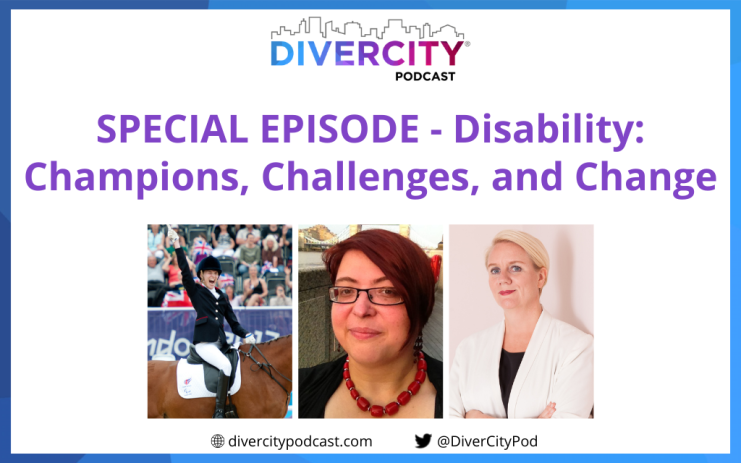
Business cannot afford to ignore disabled people

In discussions around diversity and inclusion, disability is too often the forgotten dimension. But post-Covid, with debate evolving about organisational structures and working models, it is time for businesses to make themselves truly accessible to disabled people.
Sophie Christiansen and Christiane Link joined the DiverCity podcast to discuss business attitudes on the subject of disability.
Sophie Christiansen CBE is a British dressage rider who has competed in four successive Paralympic Games and is currently an eight-time Paralympic champion. Born with Cerebral Palsy, Sophie began riding as physiotherapy at the age of six. She graduated with a First Class Master’s Degree in mathematics from Royal Holloway University of London in 2011, and today she works as a software developer at Goldman Sachs.
In her own job, Sophie is able to work remotely and flexibly, and did so before the Covid-19 pandemic, but she argues disabled people are the ‘forgotten diversity group in the City’.
“Most disabled people don’t disclose their disability because it’s seen as a weakness and just because we don’t disclose disabilities doesn’t mean that companies don’t have a responsibility,” she says.
Legally of course companies have a responsibility under the Equality Act, but she argues the terms of the Act and its enforcement are not clear enough.
“I feel the legal language [of the Equality Act] is not clear. What is a ‘reasonable adjustment’ for disabled employees or customers?” she says.
“The trouble is the Equality Act is just not enforced by our government, so businesses have been getting away with things for years and years. If a disabled customer comes along and says, ‘Wait a second, I can’t get in your building’, it should not come as a surprise.”
Technology is often seen as the easiest solution to accessibility and the pandemic has accelerated the adoption of technology in business and in customer service. But Sophie warns it is not a panacea.
“The digital boom, if you like, has been a real lifesaver for people like me with physical disabilities,” she says. “But what if you’re visually or hearing impaired? Can you access the same content? I’m not just talking about your online app or website or even social media, but also internal communication.”
For potential employees, exclusion starts at the very beginning – recruitment and that starts with the images companies present of themselves.
Sophie highlights a range of steps that companies should take to make themselves welcoming and accessible, including more representation in their media content, using language that will attract disabled applicants and ensuring the recruitment and selection processes are not exclusionary.
But crucially she says practical action is required in the workplace and the pandemic has proved that such action is possible.
“In the UK we had COVID officers going round businesses, helping them make sure it was safe for their customers and employees, because of all these new rules coming in due to the pandemic. Why can’t we have accessibility officers?”
How Covid threw a spotlight on disability is also raised by Christiane Link.
Founder and Director of Ortegalink, an inclusion and accessibility consultancy, Christiane was a journalist for more than 20 years.
As a wheelchair user herself, Christiane is passionate about access to transport for all. Mobility, she says, “is a human right”.
She is also dismissive of ‘window-dressing’ by companies such as illuminating their buildings in purple on disability awareness days. Instead, she is keen on real change and hopes the pandemic has opened people’s eyes to what is possible.
“For decades, disabled people were asking to be able to work more flexibly, to work from home, to attend a conference online and so on, and that was always rejected. On the day when non-disabled people couldn’t go into the office because we had Coronavirus, this was all not a problem,” she says.
Christiane is keen to point out that disabled people are often the first to experience problems and failures in a business that ultimately can affect everyone, both employees and customers. She argues that failure to address these issues is damaging in human terms, but also for business and the economy.
“Disabled customers are the canary in the coal mine. If you get it right for disabled customers, you get it right for everyone,” she says. “They are the first people who will notice if something’s not right in your organisation.”
As we adjust to a working life that may be permanently altered by the pandemic, it’s already well past time that business leaders stopped ignoring disabled people and began to embrace the opportunity and value those in the community could bring.
To find out more visit the DiverCity website